Hacking trial: The prosecution's case
- Published
The trial of former News of the World journalists accused of a conspiracy to hack mobile phones is now well under way at the Old Bailey.
It is a long and complex trial and the jury of nine women and three men is listening to many months of evidence.
The defendants deny all the charges and you can find answers to basic questions about the trial here.
This page is a summary of the prosecution case - latest coverage at the top.
By the way, BBC reporters are covering the trial every day and tweeting where possible. We are not all in court on the same days (#multitasking) but I will try to give followers of my Twitter feed a heads-up on what is going on.
Week of 3 February: Blair-Brooks email
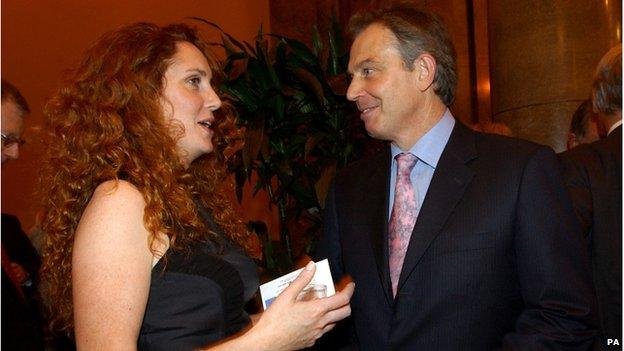
Tony Blair advised Rebekah Brooks six days before her arrest over phone hacking, a court has heard
The prosecution closed its case in the first week of February - and one of the final documents given to the jury was an email between Rebekah Brooks and James Murdoch days before her arrest in 2011.
The email revealed that former prime minister Tony Blair gave advice to Mrs Brooks over how to handle the developing hacking allegations. Mrs Brooks also said that Mr Blair would make himself available as an unofficial adviser to herself, James and Rupert Murdoch.
In separate evidence, the prosecution told the court more about an earlier part of the case that related to stories about former Home Secretary David Blunkett. The jury heard that a woman who was wrongly romantically linked to the former cabinet minister had herself tipped off journalists. She was later forced to retract her claims and apologise to Mr Blunkett.
Week of 27 January: Stars and hacking confession
At the end of January, the prosecution returned to the core central allegation of phone hacking - and they called three witnesses - a hacker and two victims.
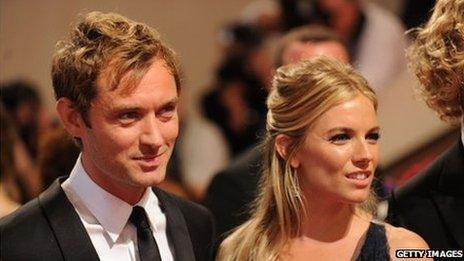
Ms Miller had been in a relationship with fellow actor, Jude Law
Jude Law appeared to give evidence on Monday about how he realised that the media had amassed an "unhealthy amount of information" about his private life in the years after he was nominated for an Oscar.
He denied ever briefing the News of the World about his relationship with actor Sienna Miller or anyone else - but said that he had employed a PR adviser to try to find out what the papers wanted.
In cross-examination, Timothy Langdale QC, for Andy Coulson, gave the actor the name of someone from his family whom he said had been paid by the newspaper to supply information.
Mr Law was followed by former News of the World reporter - and self-confessed hacker - Dan Evans.
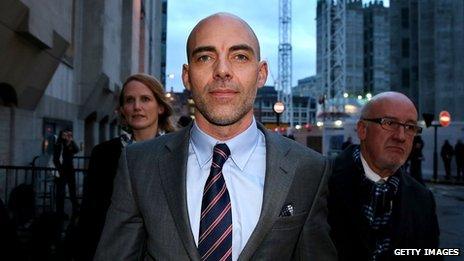
Mr Evans has pleaded guilty to hacking while working at the Sunday Mirror and News of the World
He told the jury that he had pleaded guilty to intercepting voicemails while at the Sunday Mirror and then the News of the World.
Evans alleged that he told Andy Coulson about his hacking skills at a job interview.
In the second day of his evidence, Evans said that in late 2005 he hacked James Bond actor Daniel Craig's mobile and listened to a message left by fellow actor Sienna Miller. Evans said that Ms Miller used the phrase "I love you" and he thought he had evidence of an affair.
He told the court that he played the message to Andy Coulson who, he alleges, was delighted at the possible scoop.
Evans then faced almost four days of cross-examination from Timothy Langdale QC, for Mr Coulson.
The former reporter told the court that Andy Coulson knew "exactly what went on on his watch" - and "even the office cat knew".
But in later evidence, the jury heard that Andy Coulson was not in the office on the day that Evans recalls playing the tape.
Evans conceded he may have recalled the wrong date from eight years ago - but that did not alter in his mind his memory that he had played the tape to the former editor.
The week ended with the final part of this particular allegation of hacking. Sienna Miller gave evidence by video link from New Orleans. She told the jury that although she could not remember specifics, it was likely that she had used the words "I love you" in a message for Daniel Craig.

Sienna Miller gave evidence via video-link from the US
Week of 13 January: Missing material
The allegations of attempting to hide potential evidence went into a second week. The jury were shown CCTV footage which, the prosecution says, shows Rebekah Brooks's husband leaving a laptop and a padded envelope in a car park.
The court heard that the alleged plan to hide material from the police, who were searching Mrs Brooks's London apartment, was part of Operation Blackhawk. This was a plan to protect the former News International chief executive with the help of security guards. Mr and Mrs Brooks and Mark Hanna, News International's head of security, deny conspiracy to pervert the course of justice.
The BBC's Tom Symonds explains the evidence shown in court
The following day, a forensics expert admitted to the court that he made some mistakes in evidence about the movements of a mobile phone that the prosecution have linked to the alleged plot to hide material.
Further allegations were made against Mr Hanna when a witness said that he had dug a hole in his garden to burn "stuff".
Detective Constable Alan Pritchard told the trial that when detectives searched Rebekah Brooks's homes, they failed to find any computers that had been recently used. He told the Old Bailey that police had established that some computers used by Mrs Brooks had never been found.
Jonathan Laidlaw QC, for Mrs Brooks, said that it was wrong to claim equipment had gone missing and that it had been left in her office on the day she quit.
In separate evidence, the court saw a 2011 email sent by Mrs Brooks in which she described reports that Milly Dowler's phone was hacked as a "proper Guardian, BBC, old Labour hit".
Week of 6 January 2014: Conspiracy allegations
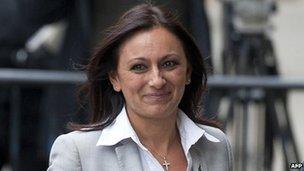
Cheryl Carter denies conspiracy to pervert the course of justice
The trial returned after the Christmas break to focus on the final part of the case against the three defendants who do not face the core allegations of phone hacking and corrupt payments. Rebekah Brooks's husband, Charlie, her former personal assistant Cheryl Carter and News International's head of security Mark Hanna are accused alongside the former NI chief executive of conspiracy to pervert the course of justice.
Prosecutors allege that Mr Brooks, Ms Carter and Mr Hanna were part of a plan to hide material belonging to Rebekah Brooks that may have been of interest to the police investigation. All four deny the charges.
The court heart that Cheryl Carter allegedly took part in a plan to permanently remove Rebekah Brooks's journalistic records from the company's archives.
The jury heard how Ms Carter contacted the company's archivists to retrieve the material the day after the decision to close down the News of the World.
Ms Carter was also allegedly offered the chance of a job at a Rupert Murdoch-owned newspaper in Australia as a reward for helping to move Rebekah Brooks's boxes.
She never emigrated because police confiscated her passport at the time of her arrest - but she also denied in police interviews that the idea had anything to do with the boxes she took out of storage.
Mrs Brooks's other former PA, Deborah Keegan, told the jury in separate evidence that she had sent internal emails to track down a diary from 2002 that could have established where her boss had been when the News of the World ran a story which included material from Milly Dowler's voicemail.
Week of 16 December: Royal girlfriend hacked
In the run-up to a two-week Christmas break, some court time was lost to legal discussions about the progress of the case, a regular feature of long and complex prosecutions.
One of days when evidence was heard included allegations for the first time that the Duchess of Cambridge's phone was hacked when she was still Kate Middleton and dating Prince William.
A message he left on the duchess's phone was discovered at Clive Goodman's home in 2006 at the time of his original arrest. In the message, the prince said he "nearly got shot" with blank rounds in an army training exercise.
Week of 9 December: Defendant no longer fit
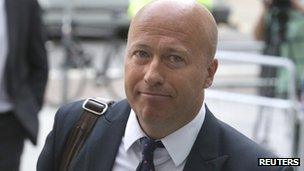
Ian Edmondson: To be tried separately
Ian Edmondson, former news editor accused of conspiracy to hack phones, was ruled to be no longer fit to to be part of the trial.
Mr Justice Saunders told the jury that he had received and read a number of medical reports about Mr Edmondson's health and he had decided that he would now be tried later by a different jury.
Earlier in the week, the jury heard more evidence about claims that Rebekah Brooks knew about allegedly illegal payments to a Ministry of Defence official for leaks that appeared in The Sun.
Brigadier John Donnelly said that one story in the paper was about the death in Afghanistan of a major associated with Prince William. He said the story had been published in October before the military had had an opportunity to fully brief his family.
But during cross-examination, the defence showed him a public MoD document from the day before the newspaper was printed, which named the soldier and explained how he had died. The Brigadier said he would not have made the criticism had he known about that document.
The trial then turned to evidence relating to allegations of a conspiracy involving Clive Goodman and Andy Coulson to pay police officers for confidential royal household phone directories known as the Green Book.
When Clive Goodman was first arrested in 2006 police found eight versions of the directory in his home.
Michelle Light, head of telephony at Buckingham Palace, said police had not told her about the discovery until almost six years later.
The jury heard that on one occasion, Clive Goodman told his editor Andy Coulson that he had got information that the Queen was furious that police officers were scoffing bowls of nuts left around the Palace - and she had started marking the bowls to see when the levels dipped.
The trial briefly returned to hearing about allegations of phone hacking and a witness gave evidence live from Los Angeles. Ambi Sitham, a former solicitor, said she had attended Andy Coulson's birthday party in January 2003 in which Rebekah Brooks and Piers Morgan, editor of the Daily Mirror, joked about hacking each other's messages.
Separately, the defence returned to an email from Andy Coulson to Ian Edmondson which read "do his phone". The prosecution say that's evidence of an attempt to hack the phone of celebrity Calum Best. The defence told the jury that Mr Coulson's email referred to a leak inquiry.
Week of 25 November: More detailed allegations
The former wife of a top golfer told the court how she had once had lunch with Rebekah Brooks (then Wade) and the editor had told her about phone hacking.
Eimear Cook, once married to Colin Montgomerie, recounted how the pair had met eight years ago after she felt targeted by newspapers. Mutual friends of Ms Cook and Mrs Brooks, by then the editor of the Sun, helped to arrange a lunch.
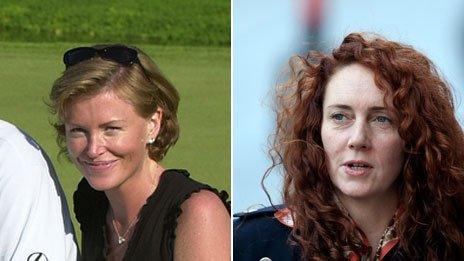
Eimear Cook (l) and Rebekah Brooks (then Wade) met for a private lunch in 2005
She told the jury that Rebekah Brooks said she couldn't believe how easy it was to access voicemails and that it was ludicrous that people did not know how to protect their privacy.
Jonathan Laidlaw QC, for Mrs Brooks, challenged that account because of what he said were important discrepancies. He accused Ms Cook of telling a lie to the police and jury about what had happened at the lunch.
In separate evidence, the jury were played a tape recording made by Clive Goodman in which he and his then editor Andy Coulson are discussing his future as he faced the first phone hacking prosecution in 2006. The recording was released to the media.
Mr Coulson says that although he could not say with certainty how the affair would end, he did not want the reporter to lose his job. Clive Goodman pleaded guilty and was subsequently jailed.
The trial also heard from Dom Loehnis, a friend of Prime Minister David Cameron, who recalled a conversation he had with Rebekah Brooks. The jury heard that they were both at the prime minister's 2010 birthday party which was held at his official country residence, Chequers.
Mr Loehnis told the phone-hacking trial Mrs Brooks said that Andy Coulson might not survive in his post as the PM's director of communications because of the phone-hacking row.
He said: "She felt the story wouldn't go away and the reason for that was that at a certain point in time people had discovered you could get into mobile voicemails. At that point in time, when people had worked it out, who knew how many people could have done it? It wasn't an easy story to close down."
Mr Coulson resigned as Mr Cameron's director of communications the following year.
Finally, we reported how the jury were given more technical evidence relating to the prosecution's allegations of how hacking was carried out.
The jury heard that calls relating to phone hacking were made through what was described as a "private wire line" at News International. This is a phone system that allows a landline to route a call through a mobile number. More than 400 calls were made to a royal aide. The trial also heard that Neil Wallis, then deputy editor of the News of the World, had his voicemail targeted
Week of 18 November: Inside the Newsroom
The week was dominated by evidence relating to how the News of the World operated and what prosecutors say is proof of wrongdoing. One witness was the paper's former night editor, Harry Scott.
He said that, while it was his job to put the stories on the right pages in the right way before the presses rolled, it was the editor's decision on where to place the articles.
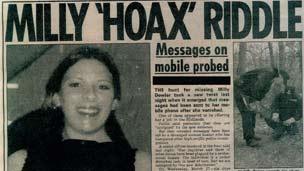
April 2002: Story changed between editions
Mr Scott was asked about this in relation to the handling of a story in 2002 about Milly Dowler. The first edition of the story contained references to her voicemail - later editions did not. The prosecution has previously alleged that Mr Coulson and Mrs Brooks must have known the Surrey teenager's phone was hacked - something they both deny.
Much of the week was dominated by documents and emails obtained from News International. The jury saw the 2005 contract signed between the News of the World and Glenn Mulcaire in which the newspaper agreed to pay his then company £104,988 over 12 months for "research and information service".
The next day, the jury saw a 2005 email from news editor Ian Edmondson in which he argued that the payments to Mulcaire - described as "Greg's investigation man" had to stop.
A former News of the World employee who organised payments to contributors said the request to stop Glenn Mulcaire's money went to the managing editor Stuart Kuttner - but the payments continued.
Prosecutors later produced an email from March 2006 in which Glenn Mulcaire was complaining about his contract renewal. Ian Edmondson replied seven minutes later:
"This is to confirm that your contract will remain the same until Feb 200.... Happy now grumpy?"
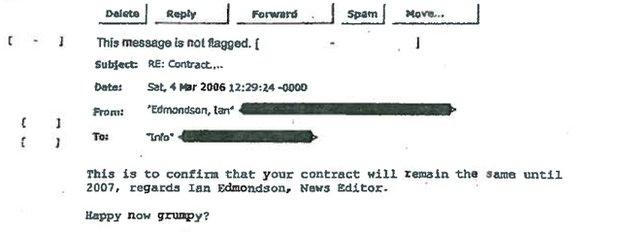
The trial also looked at the News of the World's payment system - covered in a report by my colleague Tom Symonds.
Another document produced in court was an email from Clive Goodman in which he warned, "We could all end up in jail" if payments to police officers were traced.
And the jury was also shown an email from Andy Coulson to Ian Edmondson in which the editor wrote, "Do his phone."
The opening three weeks: Allegations, accusations and affairs
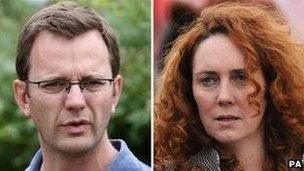
Former editors Andy Coulson and Rebekah Brooks
The trial took a few days to open because the Old Bailey needed to find jurors who were able to sit for many months. Typically, most jurors only serve two weeks and many cases may not even last more than a few days.
On the eve of the prosecution's opening, Mr Justice Saunders stressed that the defendants must get a fair hearing, saying that British justice was also on trial.
He warned the jury to avoid anything that may prejudice their assessment of the evidence, pointing out the the latest edition of Private Eye, which had a joke about Mrs Brooks on the front, was in "exceptionally bad taste".
Andrew Edis QC, the lead prosecutor, opened the case, saying that Mrs Brooks and Andy Coulson must have known about phone hacking at their newspaper.
He said that three former news editors had pleaded guilty to conspiracy - along with Glenn Mulcaire, the private eye paid £100,000 to do the hacking for the News of the World.
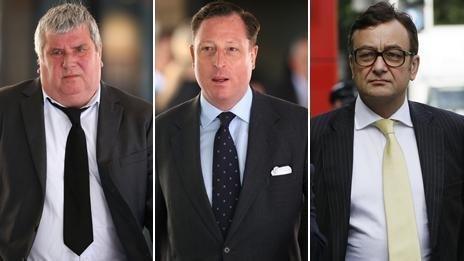
Greg Miskiw (left), Neville Thurlbeck and James Weatherup have pleaded guilty
The jury were told about public officials selling stories to the Sun, and the prosecution said that where there was a payment, there was always a crime.
Jurors heard that Mrs Brooks and Mr Coulson had a six-year affair.
The prosecution said this was relevant to the trial because it showed how much they trusted each other. "What Mr Coulson knew, Mrs Brooks knew too. What Mrs Brooks knew, Mr Coulson knew too," said Mr Edis. "That's the point."
The court heard that Mrs Brooks allegedly told a lunch companion how a story about Sir Paul McCartney and Heather Mills had come from a voicemail.
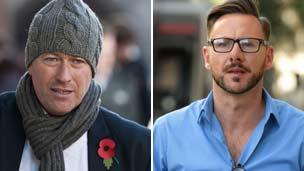
Ian Edmondson and Glenn Mulcaire
Mr Edis also described how the News of the World's Stuart Kuttner told Surrey Police in 2002 that the newspaper had information about voicemails on the phone of Milly Dowler, the teenager later found to have been murdered.
He also explained how the new police investigation into hacking began in January 2011 after News International, then the owner of the Sun and the now defunct News of the World, disclosed three emails sent by Glenn Mulcaire to Ian Edmondson.
The third day of the case began with the jury being told that in 2006 Mr Coulson had sent an email to Ian Edmondson about Calum Best, which read "Do his phone".
There were allegations of the targeting of another home secretary - this time Charles Clarke - and his special adviser.
Mr Edis said the News of the World targeted actors Jude Law and Sienna Miller, Jamie Lowther-Pinkerton, a former aide to Princes William and Harry, author Lord Archer, TV cook Delia Smith and model Abi Titmuss. The paper also targeted a woman who shared Wayne Rooney's surname - yet they were unrelated.
The court also heard allegations of corrupt payments to public officials, including for information on the deaths of members of the armed forces.
Broadsword to Danny Boy
The final part of the opening focused on the details of the alleged conspiracy to pervert the course of justice by Mrs Brooks and others, by removing her notebooks and hiding some computer equipment. One of the alleged operations involved security guards using codenames Broadsword and Danny Boy from the epic war movie Where Eagles Dare.
Timothy Langdale QC, for Mr Coulson, made his own opening address in which he reminded the jury that they had heard only one side of the story - and that his client had himself been hacked by Mulcaire.
He said that while Mr Coulson wished he had done some things differently when he was editor between 2003 and 2007, he had nothing to do with phone hacking.
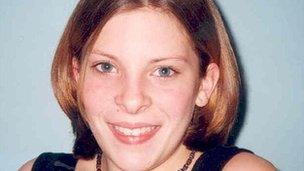
Milly Dowler was 13 years old when she went missing
Into the second week, the prosecution began their case by outlining their evidence relating to the hacking of Milly Dowler's phone in 2002.
As mentioned above, the jury have been told that Mr Kuttner, as managing editor of the News of the World, had explained to Surrey Police that the newspaper had listened to her voicemail. The email that prosecutors say he sent can be read here, external.
The story moved from News International's Wapping headquarters to Dubai where Mrs Brooks was on holiday while the newspaper was preparing different versions of the Milly Dowler story, one of which omitted references to the voicemail. The crown says that Mrs Brooks was in contact with Mr Coulson on the night in question, despite being many thousands of miles away.
That part of the story is covered here and here.
Mr Justice Saunders reminded the jury to test the evidence. He said that not everything found in Mulcaire's notebooks was agreed by the prosecution and defence to be proof of hacking, such as entries that at first glance suggested that football manager Sven-Goran Eriksson was hacked for four years.
The case moved into very detailed allegations relating to the targeting of David Blunkett when he was home secretary in August 2004.
A tape of messages left by Mr Blunkett on a married woman's phone (hacked by Mulcaire) was found in the safe of Tom Crone, a News International lawyer.
The newspaper wanted to run a story about Mr Blunkett who was in a relationship with Kimberly Quinn. Inside the safe was a draft version of the story about the affair in which the pair had been codenamed Noddy and Big Ears. The jury heard a tape recording of Mr Coulson speaking to Mr Blunkett in which the editor wanted the home secretary, as he was, to reveal details of the relationship.
Huw Evans, an adviser to Mr Blunkett when he was home secretary, later told the jury that he had challenged Mr Coulson's plans to run the story, asking what was his evidence for the relationship. But under cross-examination, he accepted that the couple had been "hiding in plain sight".
The jury also heard other voicemails left by Mr Blunkett on a different woman's phone. Those too had been recorded by Mulcaire. Mr Blunkett could be heard saying that someone in the media was trying to destroy their lives.
List of targets
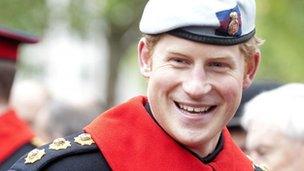
A transcript of a message from Prince Harry was shown in court
The prosecution has spent a great deal of time taking the court through hacking episodes involving people in the public eye.
Tessa Jowell was hacked while she was the culture secretary because of media interest in her husband David Mills, who had been accused of involvement in bribery linked to former Italian leader Silvio Berlusconi. Her mobile was hacked 29 times, the court heard.
The jury were also shown a document found at Mulcaire's home called Target Evaluation with 18 names on it, including Kate Middleton, Boris Johnson, Angelina Jolie's British stunt double, Mr Eriksson, Kerry Katona and others.
You can see that document on this page - although some of the names said in open court have been redacted.
The following day, the trial returned to the allegation that Mr Coulson knew of an attempt to target Calum Best, son of the footballer George - and there was also evidence that he "actively encouraged" some media intrusion into his life.
The News of the World paid him £2,000 for a story about a sexual encounter in a nightclub with Elizabeth Jagger, the daughter of Rolling Stones singer Mick Jagger. Lorna Hogan, a glamour model, revealed that she had a deal with the paper to go to nightclubs and get stories on celebrities, and she ended up having Calum Best's child.
On the same day the jury also heard that Mrs Brooks, on trial for conspiracy to hack phones, had herself been hacked. There were more details about the targeting of royal aides to Princes William and Harry.
The final day of evidence of the third week concerned former cabinet minister Charles Clarke. He and his special adviser at the time, Hannah Pawlby, gave evidence in relation to the prosecution allegation that they were targeted because the News of the World incorrectly thought they were having an affair. Mulcaire amassed notes on members of Ms Pawlby's family, including her grandparents.
Mr Coulson left a message on Ms Pawlby's phone. You can hear what he had to say here.